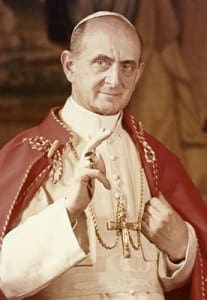Atlanta
Looking Back: November 1963
Published November 8, 2013
The historic vote by members of the Second Vatican Council to restore the permanent diaconate in the Catholic Church was the lead story in the Oct. 31, 1963 issue of The Georgia Bulletin. It noted that “nothing has been stated, as yet, as to whether or not this would include married persons.” The vote to restore the diaconate as “a distinct and permanent rank in the sacred ministry” was 1,588, yes, and 525, no. The Council Fathers also voted in support of a series of questions that stated that the college of bishops, together with the pope, has “full and supreme power over the whole Church” and has this power “by divine right.” In a subsequent issue on Nov. 14, 1963, a news story described “a dramatic high point as two great men of the Church” brought the issue to a head. “The question was whether or not the powers now exercised by the Roman curia—the central administrative body of the Church—should be returned to the bishops of dioceses. The two sides of the issue were expressed by Joseph Cardinal Frings of Cologne, Germany, and Alfredo Cardinal Ottaviani, Secretary of the Sacred Congregation of the Holy Office and president of the council’s Theological Commission.” Cardinal Ottaviani spoke against the collegiality of the body of bishops, saying, in part, “The fact is that Peter only has responsibility for the whole flock of Christ. It is not the sheep who lead Peter, but it is Peter who leads the sheep.”
“Coming out of the basilica after the meeting a number of bishops remarked that, after the exchange between the two Cardinals, they expect the Pope to intervene personally to settle the question,” the news article said.

Pope Paul VI
Pope Paul VI stated in a Nov. 14, 1963, news report that the present day in 1963 is “more than ever the hour of the laity.” He said the task of the laity “is to help the Church in her work, to make up for the shortage of the clergy, to discover modern paths along which Christ’s message can be spread.” The pope had invited lay representatives to the Second Vatican Council. “In this historic moment when the Church, gathered in council, is somehow examining her conscience and is carrying on a wide examination of her apostolic forces, we thought … some qualified representatives of the laity could and should be associated with this great reconsideration of life and be admitted to sit in the council.” He said he had heard “with pleasure” the world’s reaction to his decision regarding lay representation.
The American Jewish Committee hailed the draft proposal before the Second Vatican Council on proper relations with the Jewish community as an “historic event.”
In Georgia news, it was reported that a parcel of property was purchased in Jonesboro through the contributions of Jonesboro Catholics and a loan from the diocese. The parcel was described as five and a half acres on Highway 41, north of the Jonesboro airport. Donations to the mission over a period of four years have led to the accumulation of over $7,000 toward the building of a church in Jonesboro. Reviewing the history of the area, the Nov. 14, 1963 article said that “thirty years ago, so far as is known, there were only three Catholic women in all of Clayton County. Two of these women were aunts of Margaret Mitchell, and they were Misses Mamie and Sally Fitzgerald. They lived in a section which many people called ‘Tara,’ approximately four miles below Jonesboro. The only other known Catholic in Jonesboro at that time was Mrs. E. W. Hutcheson. At one time the situation got down to where there was only one Catholic making the sign of the cross in Clayton County,” the article said. As of 1963, however, the article said the county was the fastest growing county in Georgia and had become the 13th largest county by 1960. “Local Catholics have high hopes that in the not too distant future, a Mission Church will rise in Jonesboro to take care of the spiritual needs of the influx of faithful in this section,” the article said, advising anyone interested in supporting the establishment of a mission church to contact Father John J. O’Shea at the Hapeville parish.